
Healthy and active brain, what science has already proven and you should know
How to keep the brain healthy and young despite the passing years? Recent research on super seniors ーoctogenarians whose cognitive characteristics are those of people
How to keep the brain healthy and young despite the passing years? Recent research on super seniors ーoctogenarians whose cognitive characteristics are those of people in their 40s or 50sー found that:
The study of this privileged group also showed that they share a larger than-normal cluster of neurons in the brain layer related to memory preservation.
While many people begin to experience memory failure between the ages of 60 and 65, super-elderly people with super neurons stay out of brain decline.
As we age, our brains shrink in size, we lose neurons and more importantly, we lose the connections between them. Scientists have put the age of brain decline at 57 years, although there are factors that can speed up or slow down this process. For example, it is estimated that 45% of the risk of dementia is attributable to 14 modifiable factors. These include hearing loss, depression, physical inactivity, diabetes, smoking and social isolation.
The most common concerns related to brain health are: memory loss, cognitive impairment, dementia, etc.

f you want to keep your brain healthy and active, improve your memory and focus and keep your cognitive functions at their best, you will surely have heard of a fungus widely used in traditional Asian medicine: Lion’s Mane or Hericium erinaceus (its scientific name), the fungus of the gut-brain axis.
At Hifas da Terra, as experts in applied biotechnology, we have been studying its properties for more than 25 years, developing food supplements with high concentrations of its active biomolecules and carrying out clinical studies with universities and research centres to assess its impact. And we are not alone. PubMed, one of the largest scientific libraries available, already shows more than 400 scientific articles on this species, most of them related to cognition and gut microbiota.

Here is a summary of the highlights related to brain health:
The effect of hericenones was also evaluated in a scientific study involving 30 women aged around 41, all suffering from various ailments. The conclusion showed that Lion’s Mane could have an impact on anxiety and depression.
In addition to hericenones and erinacins, Lion’s Mane (and other species such as Chaga) is notable for containing ergothioneine, a substance studied for its impact on cellular oxidation levels, which naturally decreases after the age of 60.
There are formulas that combine Lion’s Mane and Chaga, as well as Ginkgo biloba, phosphatidylserine, Rhodiola rosea and vitamins that help reduce fatigue, and contribute to the normal functioning of the nervous system and normal psychological function.
In the Neurofood project (2018-2021), at Hifas da Terra we improved the cultivation systems and extraction processes that succeeded in generating higher amounts of GABA and ergothioneine.
In this project, a trial was also carried out in healthy humans. The experimental group was able to process more items in less time (faster processing speed), more effectively inhibiting the distracting stimuli of the target items. In addition, better performance was also observed in activities involving an attention component.
Research needs to continue, but the results obtained, from third parties and our own, justify the interest in the Lion’s Mane mushroom. And as we move forward to gather more evidence, what can be done to keep the brain’s faculties in tip-top shape?

Getting a good night’s sleep is a pipe dream for many. Whether due to family issues, hormonal changes or work-related concerns, insufficient sleep impacts our mood, and ability to remember and limits learning.
The brain needs rest to cleanse and repair itself. Thus, lack of rest may make it more difficult to eliminate toxins that limit brain function.
.
The use of screens and hyperconnectivity has already been shown to be a limiting factor in our ability to concentrate, especially among teenagers and students. Infinite scrolling, gamification and the fear of missing something make our cognitive capacities alter and we find it harder to maintain focus on what we are doing.
This 2019 research published that our neurocognitive architecture is not prepared to perform two or more tasks simultaneously, so subjecting ourselves to the stress of multitasking can reduce our productivity by up to 40%. Practising mindfulness or engaging in meditation can help to maintain focus. You can start by spending a few minutes a day focusing on your breathing – it’s a simple way to get started with meditation.
Several studies have linked cardiovascular, metabolic and immunological problems (hypertension, diabetes, asthma, etc.) to chronic stress.
If we focus on what happens in the brain when we are stressed, the same study cites research that has linked stress to depression, dementia, Alzheimer’s and other neurodegenerative processes.
This concept refers to the feeling of confusion, disconnection. It can be due to poor cognitive functioning, age, but also to poor diet, lack of rest and stress, and can even be considered a symptom of menopause due to hormonal changes.
The WHO defines brain health as ‘the state of brain functioning in the cognitive, sensory, socio-emotional, behavioural and motor domains that enables a person to develop to his or her full potential throughout life, regardless of the presence or absence of disorders’. If in 2022 the over-65s accounted for 20.1%, by 2050 they will account for more than 30% and medical societies predict an increase in issues related to ageing and brain function.
In this context, it is of interest to continue researching new resources that can help minimise cognitive decline by improving brain function. Lion’s Mane is one of the many resources being investigated, particularly for its content of hericenones, erinacins, ergothioneine; but also for its content of prebiotics and polysaccharides.
As science advances, we can act on modifiable factors that have been shown to be beneficial in preserving a healthy brain: healthy eating, restful sleep, limiting exposure to pollutants and toxins, reducing pro-inflammatory states such as those resulting from ongoing stress and mental exhaustion.
There are also supplements that can help the body by providing useful active substances. In this regard, it is necessary to check what quality and safety criteria they offer in order to know exactly what we are taking and how it can help us. Remember to consult your health professional about the suitability of the supplementation for your particular case.

How to keep the brain healthy and young despite the passing years? Recent research on super seniors ーoctogenarians whose cognitive characteristics are those of people
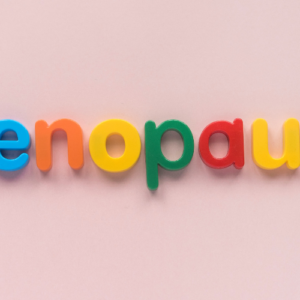
Menopause is a significant life transition that brings hormonal changes, impacting both physical and mental well-being. From hot flashes and weight gain to itchy skin
La entrada Healthy and active brain, what science has already proven and you should know se publicó primero en Hifas da Terra UK.
Menopause is a significant life transition that brings hormonal changes, impacting both physical and mental well-being. From hot flashes and weight gain to itchy skin and hair loss, many women experience a wide range of symptoms. But what exactly are the signs of menopause, how long do they last, and what natural remedies can help ease the journey?
This guide explores the key menopause symptoms and provides natural solutions to support your body during this phase.

Menopause is diagnosed when a woman has gone 12 consecutive months without a menstrual period. However, the process happens in stages:
Postmenopause – The phase after menopause, where symptoms may continue for several years but often become less intense.
Each woman’s experience is different, but common menopause symptoms include:

One of the most well-known signs is, menopause hot flashes cause sudden warmth in the face and upper body, often followed by sweating. These episodes can occur during the day or at night, disrupting sleep.
Natural relief: Cooling techniques, loose clothing, and stress management can help reduce their intensity.
Hormonal fluctuations affect neurotransmitters in the brain, leading to menopause mood changes, increased anxiety, irritability, or even depression.
Natural relief: Adaptogenic mushrooms like Reishi may help support emotional balance and resilience to stress.
Low energy levels are common due to hormonal shifts, poor sleep, and increased stress levels.
Natural relief: A diet rich in B vitamins, magnesium, and adaptogens like Cordyceps can help combat tiredness.
Metabolic changes make it easier to gain weight, particularly around the abdomen. This can also increase the risk of insulin resistance and heart disease.
Natural relief: Regular exercise, strength training, and a balanced diet focusing on protein and healthy fats can support metabolism.
Estrogen supports healthy hair growth, so declining levels can lead to thinning hair or increased shedding.
Natural relief: Scalp massages with essential oils and a diet rich in biotin, zinc, and omega-3s may help.
Lower estrogen levels can reduce collagen and skin hydration, leading to dry, itchy, and irritated skin.
Natural relief: Hydrating from within with collagen-boosting foods, drinking plenty of water, and using natural moisturizers can help.
On average, symptoms can persist for four to five years after the last period, though some women experience them for a decade or more (source: NHS UK).
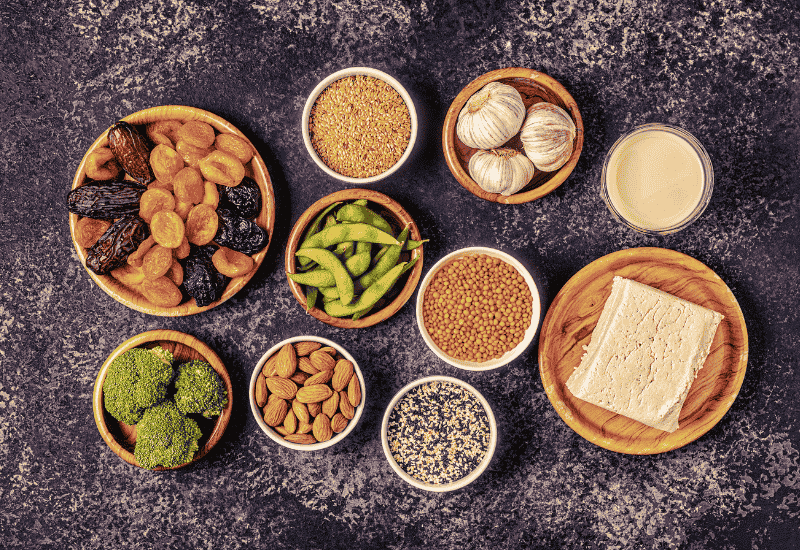
Certain mushrooms contain bioactive compounds that may help support the body’s response to hormonal fluctuations and stress.
A well-balanced diet plays a crucial role in managing menopause symptoms:
 Increase protein intake – Helps maintain muscle mass and metabolism.
Increase protein intake – Helps maintain muscle mass and metabolism. Eat healthy fats – Omega-3s (found in flaxseeds, walnuts, and fish) support brain health and inflammation reduction.
Eat healthy fats – Omega-3s (found in flaxseeds, walnuts, and fish) support brain health and inflammation reduction. Avoid sugar spikes – Stabilizing blood sugar can help prevent energy crashes and mood swings.
Avoid sugar spikes – Stabilizing blood sugar can help prevent energy crashes and mood swings.
Weight-bearing exercises like yoga, Pilates, and resistance training can:
 Prevent osteoporosis
Prevent osteoporosis Boost metabolism and help with weight management
Boost metabolism and help with weight management Improve mood and energy levels
Improve mood and energy levels
Consistent sleep schedule: Going to bed at the same time each night supports hormonal balance.
Menopause is a journey, not an endpoint. While hormonal changes can bring discomfort, taking a holistic approach with nutrition, lifestyle changes, and adaptogenic mushrooms can ease the transition.
Looking for natural menopause support? Browse our supplements here to discover solutions designed for hormonal balance.

How to keep the brain healthy and young despite the passing years? Recent research on super seniors ーoctogenarians whose cognitive characteristics are those of people

Menopause is a significant life transition that brings hormonal changes, impacting both physical and mental well-being. From hot flashes and weight gain to itchy skin
La entrada Menopause and Symptoms: How to Manage This Life Transition Naturally se publicó primero en Hifas da Terra UK.
Vaginal dryness is still a taboo subject. However, it is a widespread problem that affects mainly women in menopause but also occurs in younger women.
Vaginal dryness occurs when the natural moisture of the vagina decreases, which is usually due to hormonal causes such as menopause, stress or certain medications.
Symptoms range from unpleasant itching and burning to pain during sex. In this article, you will learn all about the causes, symptoms, and options for dealing with vaginal dryness.

Vaginal dryness is characterized by various symptoms. Typical signs are usually:
If you notice one or more of these symptoms, you should consult a specialist. They can clarify the causes and recommend an appropriate treatment.

Personalised intimate care can help to alleviate discomfort and improve and maintain intimate health in the long term. It is important to use natural and gentle care products that have a soothing and moisturising effect. However, it is also important to lead a healthy lifestyle: a balanced diet, regular exercise and avoiding irritating care products play a key role. Products such as Hifas-INTIMA Gel (moisturising and lubricating) Oral (vaginal pre- and probiotics) are the ideal companions to treat dry vagina and quickly relieve symptoms effectively.

Dryness of the mucous membranes is a common problem that can be aggravated by hormonal changes or external influences. Vaginal creams, intimate gels and special dietary supplements can help restore the natural moisture of the vagina and regenerate the mucous membranes. Products such as Hifas-INTIMA Oral and Hifas-INTIMA Gel offer a specific solution for vaginal dryness. They combine natural ingredients with scientifically developed formulas to support the vaginal flora and mucous membranes.
Hifas-INTIMA Oral is a vaginal probiotic that cares from the inside. It contains probiotic cultures such as Lactobacillus rhamnosus, as well as prebiotics and vitamins that strengthen the mucous membranes and promote the balance of the vaginal flora. Daily intake of vaginal probiotics can specifically help relieve symptoms such as vaginal dryness and prevent recurrent infections.
Hifas-INTIMA vaginal gel also offers external care. With ingredients such as hyaluronic acid, aloe vera and Herizumib®, it moisturises, soothes irritated skin and promotes the regeneration of mucous membranes. The intimate gel is easy to use, absorbs quickly and is compatible with contraceptives.

Although Hifas da Terra intimate care products are effective, the treatment of vaginal dryness should be considered holistically. A healthy diet rich in omega-3 fatty acids, vitamin E and sufficient water intake can also contribute to the health of the mucous membranes. Regular exercise also contributes to blood circulation in the intimate area and can increase well-being.
Stress and lack of sleep are common factors that can promote vaginal dryness and increased sensitivity. It is particularly important to actively support the body and mind during difficult phases of life. Regular rest breaks, meditation and conscious and enjoyable exercise (sport adapted to your physical condition) can play a valuable role in this regard. The natural food supplement Equilibrium from Hifas da Terra can also be of great help. This natural formula helps reduce stress, harmonise body and mind and increase well-being – valuable support for women’s overall health .
In addition to these measures, it is important to focus on gentle intimate hygiene and avoid harsh cleaning products, as they can upset the balance of the delicate vaginal environment. Instead, mild pH-neutral shampoos are recommended to promote natural balance. In addition, if symptoms persist, it is always advisable to consult a specialist.
Vaginal dryness is a problem that affects many women, but it should not be ignored. With a combination of specific intimate care and a healthy lifestyle, the associated discomfort can be avoided. Products such as Hifas-INTIMA Oral and Gel are valuable companions that support your intimate health and help you feel more comfortable.
Give your intimate health the attention it deserves. Start holistic care today and benefit from natural support for a better outlook on life.

How to keep the brain healthy and young despite the passing years? Recent research on super seniors ーoctogenarians whose cognitive characteristics are those of people

Menopause is a significant life transition that brings hormonal changes, impacting both physical and mental well-being. From hot flashes and weight gain to itchy skin
La entrada Vaginal dryness: causes, symptoms and solutions for greater well-being se publicó primero en Hifas da Terra UK.
Food supplements based on medicinal mushrooms are attracting growing interest. Reishi, Lion’s Mane, Chaga, Cordyceps… These names, once familiar only to connoisseurs, now resonate far beyond thanks to a piece of booming scientific news. Mycotherapy – which consists of using bioactive molecules from mushrooms for health purposes – has established itself as a major asset in the world of food supplements.
Yet, behind this craze, a challenge arises: deciphering labels and understanding the terminology that oscillates between technicality and marketing. Terms such as “ Full Spectrum ”, “ biomass ”, “ mycelium ”, or even “ primordia ” often appear without any real explanation being provided. Behind certain expressions lie practices that harm the quality of the product, thus misleading the consumer about the real value of their purchase.
Why this article? Because at Hifas da Terra, we firmly believe that the power of mushrooms lies above all in their quality, their production method and their precise composition. Our mission is therefore to provide you with the keys to decipher this jungle of terms and allow you to distinguish a good supplement from a product that focuses more on marketing than on effectiveness.
To navigate the ocean of mushroom supplements without fear, as with navigation, you need to know the terms.
These names, sometimes legitimate, sometimes marketing can influence our choices, often without us understanding what they imply. In this section, we decipher the jargon surrounding medicinal mushroom supplements.
Let’s start with a phrase you may have seen on labels before: “ Full Spectrum .”
In its rigorous definition, a “Full Spectrum” extract should include all the bioactives of the mushroom, water-soluble (extracted by hot water) and fat-soluble (extracted by alcohol). This process ensures maximum bioavailability by eliminating chitin, an indigestible component that traps these bioactives in the cell walls.
However, some producers use this term to refer to mixtures of mycelium, substrate, and sporophore, thereby diluting the concentration of bioactive and deviating from the idea of a true “full spectrum”. These products, while appealing in theory, often offer little benefit.
At this point, you may still think that this is not a bad product, but understand that when the mushroom is grown on a solid substrate, the substrate occupies a – very – important place in what is harvested.
“Biomass” generally refers to all the elements produced during a mushroom’s growth cycle.
However, it is crucial to note that the biomass frequently includes the substrate (grains, cereals, etc.) not fully digested by the fungus. This means that a significant portion of the final product may consist of starch, diluting the proportion of active compounds such as beta-glucans and triterpenes.
But why to integrate starch into products, you might ask? Because starch is a polysaccharide, just like… ß -1,3/1,6-D-glucans ! There’s nothing like a product full of starch to artificially inflate the levels present in the product, especially since cereal is much less expensive and easier to produce.
Is it possible to determine the composition before buying? Not really, but a quick test allows you to check whether or not there is starch in the capsules. We tried it at Hifas if you want to take a look!
Mycelium, often described as the “root” part of the mushroom, is a network of filaments that absorbs nutrients to fuel growth. Although rich in interesting secondary compounds, mycelium grown on grain (MOG) often contains large amounts of undigested grain residue.
This production method can result in a final product containing more carbohydrates than mushroom-specific bioactives. This is why it is essential to favour extracts from pure mycelium (grown in a bioreactor) or fruiting bodies (also called sporophores).
The sporophore, the visible and harvested part of the mushroom, is usually the peak in terms of concentration of bioactives . This is where triterpenes are found in Reishi, or cordycepin in Cordyceps.
These are also, in most cases, the only parts of the mushroom allowed in food supplements.
However, some mushrooms, such as Chaga, contradict this rule: their active compounds develop mainly in the mycelial mass resulting from their fight against the host (birch, in this case).
The effectiveness of Mycotherapy is partly based on the extraction method used. Indeed, the bioactives contained in mushrooms ( beta-1,3/1,6-D-glucans, triterpenes, and other specific compounds ) are often enclosed in chitin, an insoluble fibre that is difficult for the human body to digest. Extraction releases these compounds and makes them bioavailable. Each method has its advantages and limitations, but their choice depends on the type of mushroom and the targeted benefits.
Here is an overview of the main extraction methods that you can find among operators in the sector.
Now that you have the keys to analyzing functional mushroom product labels, let’s get down to business! Below are three examples of products with the information displayed on their labels. Which of them stands out in terms of quality? Why? Take a moment to think about your answer, then check your conclusions a little further down.
This is the perfect opportunity to put your new skills into practice and become an informed consumer in the field of Mycotherapy! 

While extraction methods or the absence of additional raw materials in a product may seem reassuring, one crucial piece of data is missing in each of the examples analyzed: the quantification of specific bioactive molecules. Why is this so important? We explain everything to you…
Did you know? A study conducted in Italy revealed that approximately 68.4% of medicinal mushroom supplements do not meet the quality or identification criteria displayed. This figure illustrates a frequent lack of rigour in the production and marketing of these products, with compositions sometimes far removed from what is claimed.
To ensure an informed and effective choice:
Rigorous laboratory testing, combined with transparent traceability, is essential to ensure the authenticity and efficacy of a food supplement. Without these guarantees, even a “100% mushroom” product can be disappointing.
 The composition of bioactive active ingredients is therefore the only real evaluation criterion, beyond promises of extraction or natural origin. Make sure you can always check these elements before making your choice.
The composition of bioactive active ingredients is therefore the only real evaluation criterion, beyond promises of extraction or natural origin. Make sure you can always check these elements before making your choice.

Experts in biotechnology for 25 years, we are committed to developing manufacturing processes specific to each mushroom, respecting their unique characteristics. Each species has distinct bioactive molecules, requiring adapted methods to maximize their potential.
Our in-depth quantitative analyses of fungal strains allow us to understand their bioactive profiles and design tailor-made extraction and production processes.
To ensure impeccable quality, we apply the “ Hifas Quality System ”, which controls every step, from mushroom cultivation to the final formulation. In this way, we assure our customers of reliable, effective and high-quality products. Discover our extraction process in the video below.
La entrada Full Spectrum, Biomass, Double extraction… Understanding Mycotherapy terminology se publicó primero en Hifas da Terra UK.
Have you been feeling under the weather and bouncing from one discomfort to another for the last few months? You might have pinpointed a possible culprit: a weakened immune system. But how can you be sure it’s to blame for your ailments? It’s time to take a closer look.
A weak immune system can quietly undermine your energy levels and overall quality of life. This vulnerable state leaves your body open to frequent infections, slows down healing, and can lead to persistent fatigue. These symptoms, though often overlooked, can significantly impact your overall well-being.
In this blog article, we’ll explore the root causes of a weakened immune system, help you identify the warning signs, and uncover natural solutions to restore your health and vitality.

A weakened immune system doesn’t just happen. It is often resulting from a combination of lifestyle, environmental and biological factors. There are several underlying causes of this fragility, ranging from diet to daily habits.
A weak immune system doesn’t happen overnight. It usually results from a combination of lifestyle, environmental, and biological factors. For instance, an unbalanced diet can harm immune health. A lack of essential nutrients, such as vitamin D or zinc, impairs the body’s ability to fight infections and produce effective immune cells. Vitamin D, particularly crucial during the winter months, supports the body’s response to respiratory infections, while zinc strengthens immune defences.
As you know, food is our first medicine, but when it becomes unbalanced, it can play an antagonistic role in our immune health. An unbalanced diet lacking vitamins, minerals or omega-3s can impair the production and effectiveness of immune cells. For example, vitamin D, which is often deficient in winter, is particularly important for the body’s response to respiratory infections. Similarly, a zinc deficiency can reduce the body’s ability to fight pathogens.
Often cited in a plethora of illnesses when this factor is lacking, physical activity can also affect the immune system. We can’t stress this enough: moderate exercise stimulates blood circulation, which enables white blood cells to circulate more effectively in the body and fight infection.
Finally, insufficient sleep is a major cause of weakened immune defences. It is during sleep that the body regenerates and strengthens its defence systems. Sleeping less than seven hours a night disrupts this process and reduces the effectiveness of the immune system, making the body more susceptible to infection.

Our lifestyle is not the only cause of poor immune health. Our psychological state is also largely responsible for its imbalance. One example is chronic stress: one of the most damaging psychological factors for the immune system. When we are subjected to prolonged stress, our bodies release cortisol, a hormone which, although useful in small quantities, can have deleterious effects when produced in excess. Cortisol weakens the activity of white blood cells, which are essential for the body’s defence against infection. Constant stress can make our immune system less reactive and more vulnerable.
Similarly, exposure to toxins is a major environmental factor. Pollution, tobacco and alcohol are all agents that damage the body’s cells and disrupt immune defence mechanisms. These substances can weaken the effectiveness of the immune system by reducing the body’s ability to eliminate pathogens and repair damaged tissue.
Finally, seasonal variations and climatic changes can also affect our immunity. By way of illustration, we can all think of the harsh winter months when the sun fails to shine and our bodies are naturally weaker.
Knowing the possible causes is one thing, but detecting the signs of a weak immune system is essential if we are to take action in time and avoid health complications.
The symptoms can be varied, but some are fairly easy to recognise.
Firstly, frequent infections are a warning sign. If you often catch colds, strep throat or flu, it may be because your body is having trouble defending itself against germs. Another common sign is persistent fatigue. This is not normal tiredness after a long day, but a feeling of lack of energy that doesn’t go away even after a good night’s sleep. Finally, skin problems such as acne, eczema or wounds that take a long time to heal can indicate that your immune system is not working as it should.

For some people, the signs may be more specific. For example, digestive problems such as frequent bloating or diarrhoea can show that your intestinal microbiota – which plays a key role in immunity – is out of balance. Another less obvious but equally important indicator is the reactivation of viruses that have been dormant in your body, such as herpes or shingles. These viruses tend to return when the body’s defences are weakened.
Fortunately, there are natural and accessible solutions to help your immunity function properly.
In the same way that they can be at the root of immune weakness, diet and lifestyle can help to restore it. Certain plants, mushrooms and vitamins can also help.
Please note that this advice does not replace a consultation with your doctor. If you notice persistent signs of immune weakness, it is important to talk to a healthcare professional. A drop in immunity can sometimes be linked to autoimmune diseases or other underlying disorders requiring specific treatment.
Your diet is the foundation of your immune system. By eating the right nutrients, you help your body to prepare itself against external aggression. For example, vitamin C, found in citrus fruit, kiwi fruit or peppers, is essential for strengthening your white blood cells, the cells that fight infection. Vitamin D is just as important: it boosts the immune response and is found in foods such as oily fish, for example, salmon or mackerel. If you lack sunlight or don’t eat enough of these foods, you may want to consider taking a supplement. Finally, zinc, found in seeds, nuts and legumes, helps your body produce effective immune cells.
At the same time, it’s also important to limit certain foods. Ultra-processed foods, rich in refined sugars, weaken your immune defences and increase inflammation in your body. Excessive consumption of caffeine or alcohol can also disrupt the proper functioning of white blood cells, reducing your ability to fight infection.

Reishi, also known as the ‘mushroom of immortality’, is renowned for its beneficial effects on the immune system. Studies show that incorporating Reishi extract, which is particularly rich in ß1,3/1,6 glucans, helps to boost immune markers. These compounds stimulate the production and effectiveness of certain immune cells, making our defence system more vigilant in the face of external aggression.
To reap its benefits, you can take Reishi in capsule form, especially concentrated extracts such as those offered by Hifas da Terra, which ensure optimum absorption. You can also take it as an infusion or in powder form, to be mixed into your hot drinks or smoothies for easy and pleasant use.
As well as eating well, certain daily habits play a key role in keeping your immune system strong and resilient.
A weak immune system can be strengthened through a healthy lifestyle, a diet rich in essential nutrients and the use of natural solutions such as Reishi. By incorporating these practices into your daily routine, you can give your body the tools it needs to better defend itself against external aggressors.
To find out more, explore the Hifas da Terra range and discover our medicinal mushroom extracts, designed to support your immunity naturally.
La entrada How to Strengthen a Weak Immune System Naturally se publicó primero en Hifas da Terra UK.
The best diuretic for fluid retention is your hard work and determination. Doesn’t that sound poetic? A little, but with the correct choices of nutrients, exercises and quality supplementation, you couldn’t agree more.
The stifling heat accentuates the heaviness in legs and feet, the annoying sensation of swollen legs and the search for relief: what is the best diuretic for fluid retention? Tired legs can hide different ailments although, in a very widespread way, they potentially are the consequence of unhealthy habits.

By practicing regular exercise and a balanced and healthy diet, you can improve… but not all exercise has the same effect and not all vegetables are ideal.
In the following text we get to the point: we summarise the highlighted ways to improve that feeling of heaviness and, watch out! new related studies so that fluid retention is not adding to weight gain, cellulite or spider veins. Take note!
Fluid retention, also known as oedema, is when the body accumulates fluid in the tissues, causing swelling and a feeling of heaviness.
According to various studies, the formation of oedema in the extremities can sometimes be related to digestive, renal, cardiovascular and hormonal problems. In this regard, it is necessary for a health professional to review the real reasons for fluid retention. These are the most common:
These medications, which are potent diuretics used to eliminate fluids, must be purchased at pharmacies and taken only under medical supervision and prescription.
However, a high-salt diet and a sedentary lifestyle are usually the most common causes of fluid retention. Therefore, the most effective measures are aimed at real changes in everyday life.

If you are leaning towards natural options to find the best diuretic for fluid retention, here are some suggestions based on recent publications that might help.
In this regard, it is important to remember that these natural methods do not replace medical consultation. It is advisable to speak with a health professional before trying any treatment, especially if you have pre-existing health conditions or are taking medications. Here are some natural options you might consider:
It may seem counterintuitive, but drinking enough water can help reduce fluid retention. Proper hydration can help flush out toxins and maintain a healthy fluid balance in the body. You’re probably already aware of this, but give it a try: think about the last time you accidentally skipped a drink, and then think about when you did drink water consistently and regularly. It never fails – your body flows better with water.
Therefore, anything that causes dehydration is not recommended, and yes, alcohol is on this blacklist!
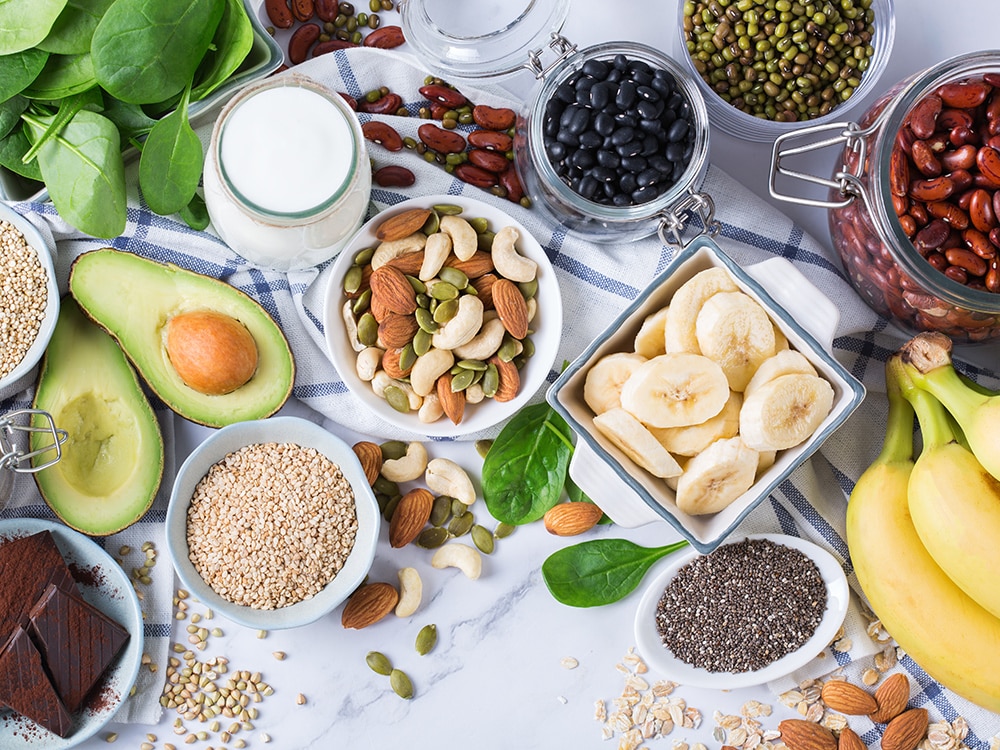
We know this, but it seems that we still don’t give it the importance it deserves. A healthy diet improves almost all aspects related to health. Things don’t get better as we get older… Although some use genetics as an excuse, today we know that it is not everything.
In this order: diet, exposure to ultraviolet rays and hormonal differences, cited by the author of a recent study as the factors that influence the development of diseases (in addition to genetics).
In this case, to reduce fluid retention, choose foods rich in potassium: bananas, spinach, avocados, oranges and watermelons. Potassium can counteract the effects of sodium and promote the elimination of fluids.
It’s not an easy task either, trust me I know… if you start eating without salt, everything seems to have no flavour, but it’s a matter of habit. If you start giving up salt and sugar, you’ll see that food tastes good on its own. Are you not convinced? Keep reading:
And if you don’t want to cut out the salt you choose to add, choose to cut out the hidden or invisible salt you unintentionally consume through ultra-processed foods.
If you need some guidance, here it is: The World Health Organization (WHO) recommends a maximum daily intake of 5 g (one teaspoon).
On product labels, you can do the following calculation: amount of sodium x 2.5. The result will be the grams of salt that the food contains.

Since there is a close relationship between high blood pressure and fluid retention , when choosing a sport that helps you, opt for aerobic and cardiovascular exercise that activates, above all, the circulatory and lymphatic systems of your lower body.
However, once again, regular exercise is the most effective way to do it. Movement not only helps you lose weight, it can also be the best diuretic for fluid retention.
Once again, I invite you to reflect: how many hours a day are you standing? How many hours are you sitting in a chair? Standing or sitting in a chair promotes the creation of oedema and retention. Many office jobs, among others, are notable for the ‘poor mobility’ they offer. If this is your case, try to move outside of your working hours as much as possible and rest for at least 7-8 hours.
In this case, consistency has its rewards.
Some plants have been hailed as stars for helping to eliminate excess fluids from the body. Among the names that sound most familiar to you are dandelion, horsetail, but also artichoke extract, for example.
In general, they are usually consumed in infusions, although in the case of extract (the most concentrated form on the market), they are usually consumed in capsules or tablets: the appropriate dosage is simplified with this format, which in turn improves adherence to the product since its flavour could be compared to more than 10 infusions… Too much potency.
These are two names that are still little known in our latitudes… for now. However, we are dealing with two of the most consumed mushrooms in Eastern cultures and they are now available in the form of quality supplements (organic, pure extracts) through different brands.
In our laboratory (Hifas da Terra) we do not only produce the organic supplement following pharmaceutical quality standards. As biologists with more than 20 years of experience in the study and R&D in applied biology, we select the best strains to produce the organic crops of each species and, subsequently, we choose the most appropriate extraction processes to obtain the highest quality supplement that can be found on the market.
In order to take advantage of all the power and purity of Maitake and Polyporus, in our product catalogue you will find HIFAS-Detox , the supplement in capsules containing 100% pure organic standardized extracts of Maitake and Polyporus.
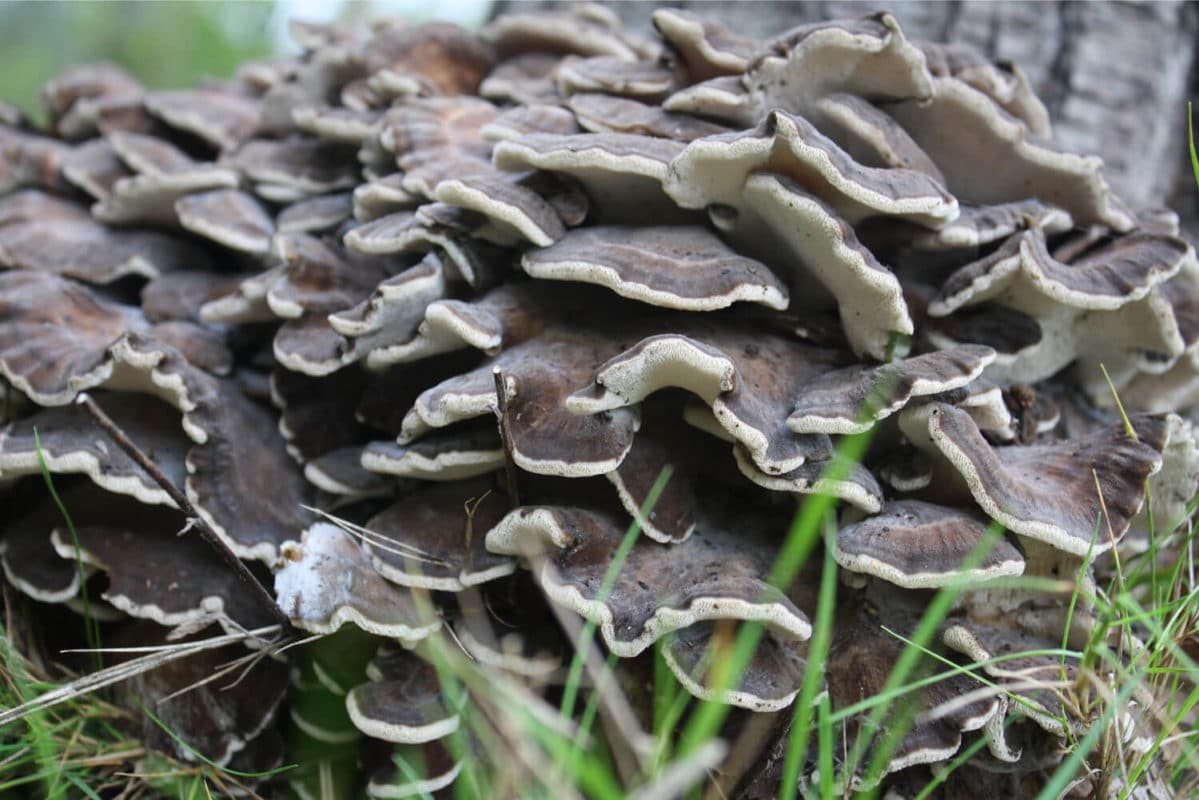

1. Perform physical activity regularly
Exercise can stimulate circulation and promote fluid elimination through sweating and breathing. Consult with a health care professional before beginning any exercise program, especially if you have pre-existing health conditions.
2. Raise your legs
If you experience fluid retention in your legs and feet, elevating your limbs can help reduce swelling. Try resting with your legs elevated above the level of your heart for a few minutes several times a day.
3. Avoid standing or sitting for long periods
Prolonged inactivity can impair circulation and contribute to fluid retention. Try to move and change positions regularly, especially if you have a sedentary lifestyle.
4. Avoid excessive exposure to heat
Heat can make leg swelling worse. Try to avoid prolonged sun exposure and seek out cool or air-conditioned places when possible. If you spend a lot of time outdoors, try to keep your legs in the shade and wear light, loose clothing.
5. Avoid tight clothing
Wearing tight clothing around your legs, such as tight pants or socks/elastics with tight bands, can hinder blood flow and contribute to swelling. Opt for loose, comfortable clothing that allows for proper circulation.
6. Massage your legs
A gentle leg massage can help stimulate circulation and relieve swelling. In this post, we tell you the highlights of lymphatic drainage, its benefits and how it works in your body.
Remember that if leg swelling persists, worsens, or is accompanied by other worrying symptoms, it is important to seek medical attention for a proper diagnosis and appropriate treatment.
If you want to improve the feeling of heaviness in your legs, activate the diet + exercise + supplements + self-care (massages) plan to regain that unbeatable feeling of ‘feeling good’. Choose suitable foods with potassium and low sodium content, hydrate yourself abundantly (with water) and avoid alcohol whenever possible. Opt for unsalted nuts and other healthy snacks instead of reaching for the chips. And don’t forget to move, move your legs regularly: a little every day for many days is better than a lot in one day. The magic recipe is consistency. Don’t let it be said that you haven’t been told.

How to keep the brain healthy and young despite the passing years? Recent research on super seniors ーoctogenarians whose cognitive characteristics are those of people

Menopause is a significant life transition that brings hormonal changes, impacting both physical and mental well-being. From hot flashes and weight gain to itchy skin
La entrada At last we have found the best diuretic for fluid retention se publicó primero en Hifas da Terra UK.
Women’s intimate health is a multifaceted and essential aspect of overall wellbeing. It encompasses more than just comfort and hygiene, it’s about creating a foundation of resilience to address common health concerns like HPV, recurrent infections, and hormonal changes. Emerging research has shown that supporting the immune system and maintaining a balanced vaginal microbiota play pivotal roles in addressing these challenges naturally and effectively.
The vaginal microbiota refers to the community of microorganisms (mainly bacteria) that live in and populate the vagina. These microorganisms play a vital role in maintaining vaginal health by creating a balanced environment that protects against infections and ensures proper function of the vaginal mucosa.


Human papillomavirus (HPV) is one of the most prevalent viral infections affecting women and can be passed on through close skin-to-skin contact, usually during sexual activity. Around 14 types of HPV are considered high-risk and can lead to cervical cancer. Two of these types (HPV 16 and HPV 18) cause around 70 out of 100 (70%) of all cervical cancer cases.
While many HPV infections clear naturally through immune responses, a compromised immune system or imbalanced microbiota can prolong the infection, leading to complications.
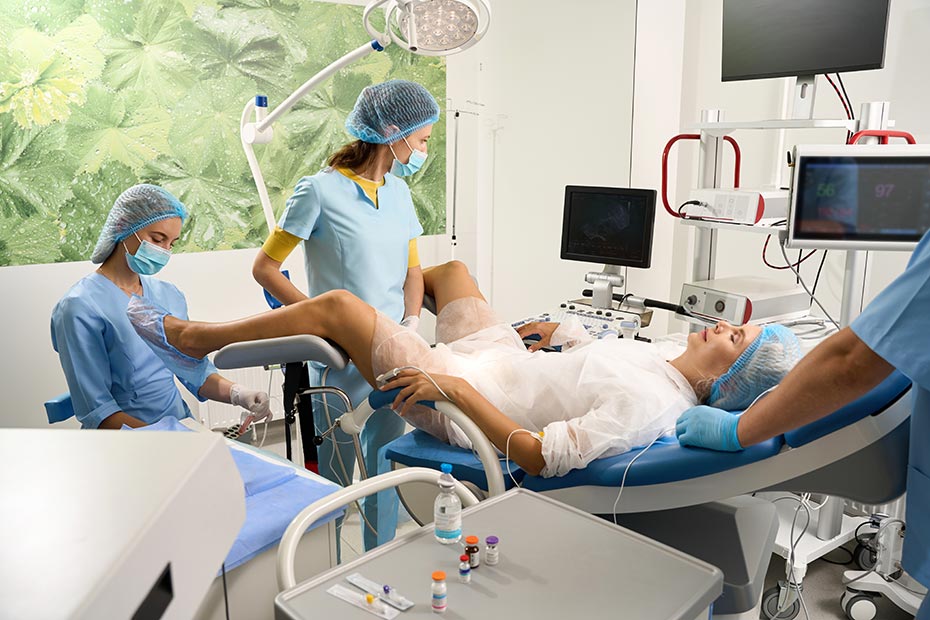
Many women experience recurrent vaginal or urinary tract infections (UTIs), which can significantly impact their quality of life. These infections are often associated with bacterial imbalances in the vaginal microbiota, triggered by factors such as:
Rebalancing the microbiota is a cornerstone of preventing vaginal or urinary infections. Probiotics like Lactobacillus rhamnosus and Lactobacillus crispatus have been clinically shown to restore the vaginal flora and reduce pH levels, which protect against the growth of harmful microorganisms. Combining probiotics with prebiotics and adaptogenic nutrients may further enhance this protective effect.
The immune system and microbiota are deeply interconnected, influencing intimate health and overall vitality. When these systems are in balance, women experience:
Lifestyle interventions such as maintaining a nutrient-dense diet, reducing stress, and using targeted nutritional or microbiota support can be transformative in managing intimate health concerns.
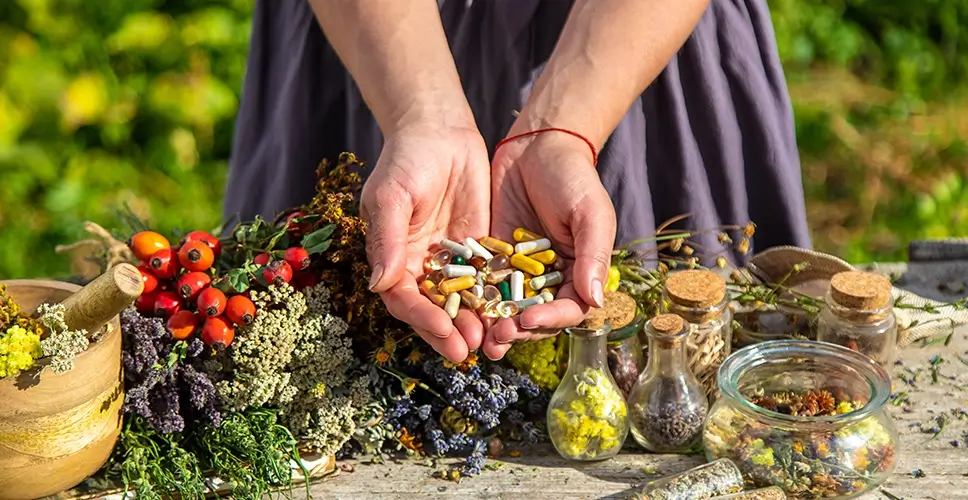
Strengthening the immune defences is vital in reducing susceptibility and aiding the body’s natural ability to combat the virus.
Key factors that can influence immunity against HPV include:
Addressing these factors can provide a robust defence against HPV and aid in clearing viral infections affecting the vaginal mucosa.
Women’s intimate health extends beyond hygiene, encompassing resilience against challenges like recurrent HPV infections, and hormonal changes. Central to this is the vaginal microbiota, a community of microorganisms, primarily Lactobacilli, that maintain an acidic vaginal pH which acts as a protective barrier against infections. Disruptions in this balance can lead to conditions like bacterial vaginosis and recurrent urinary tract infections (UTIs).
Factors such as antibiotics, hormonal shifts, stress, and diet can disrupt the microbiota, but targeted interventions like probiotics, prebiotics, and adaptogenic nutrients can restore balance. Human papillomavirus (HPV), a common viral infection linked to cervical health, can persist if the immune system is weakened or the vaginal microbiota is imbalanced. Strengthening immunity through micronutrients like vitamins A and C, and promoting a healthy microbiota with probiotics, helps combat HPV and other infections.
A well-functioning immune system and balanced microbiota not only reduce infection risks but also improve vaginal comfort, sexual health, and resilience to environmental and hormonal stressors. Lifestyle changes, including a nutrient-rich diet and stress reduction, play a vital role in supporting overall intimate health.
La entrada The Crucial Role of Immune Health and Microbiota Balance in Managing HPV and Vaginal Health se publicó primero en Hifas da Terra UK.
Madrid, November 2024 – Hifas da Terra is at the forefront of biotechnological research as part of the AI-VIDDA project (Artificial Intelligence and Biotechnology Adapted to New Tools for Intervention in the Elderly to Increase Healthy Lifespan). This collaborative initiative, funded through the Feder Galicia 2021-2027 operational programme, aims to revolutionise the prevention and treatment of cognitive impairment in older adults by developing integrated solutions combining artificial intelligence and biotechnology.
In addition to Hifas da Terra, the AI-VIDDA project brings together a consortium of organisations including Geriavi (DomusVi), Balidea Consulting & Programming, Academia Trinidad, Niucom 180, and Inovalabs Digital. This diverse group of experts in health, technology, and education is united by the goal of fostering active and healthy ageing. With an overall budget of €3.6 million, €1.65 million of which is co-financed, the project is part of the Smart Specialisation Missions of Galicia (RIS3 2021-2027). Notably, only two projects were selected under this funding programme, underscoring the competitive and innovative nature of AI-VIDDA.
The project’s primary focus is the creation of advanced tools to promote active and healthy ageing. By processing large volumes of data through artificial intelligence, the project will develop personalised intervention strategies. Within this framework, Hifas da Terra will lead the biotechnological research, creating new ingredients from medicinal mushroom extracts designed to slow cognitive decline in early-stage Alzheimer’s patients. This ambitious work will culminate in the most extensive clinical trial in Hifas da Terra’s history, carried out in collaboration with the Fundación Biomédica Galicia Sur and involving 500 patients.
Hifas da Terra’s participation in the AI-VIDDA project reflects its dedication to biotechnological innovation and the pursuit of solutions that enhance the quality of life for older adults. This initiative represents a significant milestone for the company and highlights the untapped potential of medicinal mushrooms in the field of applied neuroscience.
Through AI-VIDDA, Hifas da Terra and its consortium partners are paving the way for groundbreaking advancements in tackling the challenges of ageing. This project further establishes Galicia as a leading hub for technological and health innovation.

How to keep the brain healthy and young despite the passing years? Recent research on super seniors ーoctogenarians whose cognitive characteristics are those of people

Menopause is a significant life transition that brings hormonal changes, impacting both physical and mental well-being. From hot flashes and weight gain to itchy skin
La entrada Hifas da Terra participates in pioneering clinical trial for early alzheimer’s disease using medicinal mushrooms and artificial intelligence se publicó primero en Hifas da Terra UK.
Let’s explore the world of the “sunshine vitamin,” also known as Vitamin D, an essential nutrient that does so much more than keep our bones strong! You might already know it’s crucial for our mental health and immunity, but did you know it’s also a fantastic support for helping to reduce muscular pain?

So, how does Vitamin D come to the rescue regarding muscle discomfort? This superstar nutrient supports muscle function, reduces inflammation, and increases calcium absorption, key components for healthy muscle contraction. When we’re deficient in Vitamin D, we might experience muscle weakness and discomfort. Plus, if you’re dealing with chronic pain conditions, it’s common to find low levels of Vitamin D hanging around. Optimising your levels can help us feel stronger, recover quicker, and minimise pain.
If you’ve been looking into Vitamin D food sources, you’ve probably encountered the usual suspects like oily fish, eggs, and meat. But what if you follow a vegan lifestyle? No worries! You can still get your Vitamin D fix from plant-based options like Vitamin D3 sourced from lichen and algae. It’s a natural and effective alternative to keep your levels up

While soaking up the sun is the best way to get your Vitamin D fix, don’t forget about some tasty food sources that contain vitamin D, and help with its absorption! Check out these gems that can help increase your levels:
It’s true: low Vitamin D levels can lead to muscle pain and weakness. Supplementing can improve muscle strength and ease discomfort, especially for those who start with lower levels. This nutrient is a game-changer! Low levels of Vitamin D show a high correlation with an increase in chronic pain conditions and may exacerbate issues like fibromyalgia, leading to muscle weakness and discomfort. Incorporating these natural sources into your diet:
In conclusion, Vitamin D is much more than just an immune-strengthening nutrient – it is crucial for maintaining strong, pain-free muscles. While sunlight remains the best source of ensuring you get enough Vitamin D, whether through food or supplements, can significantly affect how your muscles feel and function. If you’re experiencing muscular aches or chronic pain, increasing your Vitamin D intake could be the key to finding relief.
La entrada Vitamin D for Muscular Pain: Unlocking the Sunshine Vitamin’s Power to Relieve Aches se publicó primero en Hifas da Terra UK.
Under the title Your diet can change your immune system, recently published in Nature.com, clinical experiences on the impact of diet on the immune system and a list of foods to help improve immune defences are presented.
Some of the researchers cited in this article observed that in just two weeks, keto or vegan diets modified the activity of immune cells. There are many who believe that a diet, lacking in essential nutrients, can undermine the function of our immune defences, while a particular diets can promote it.
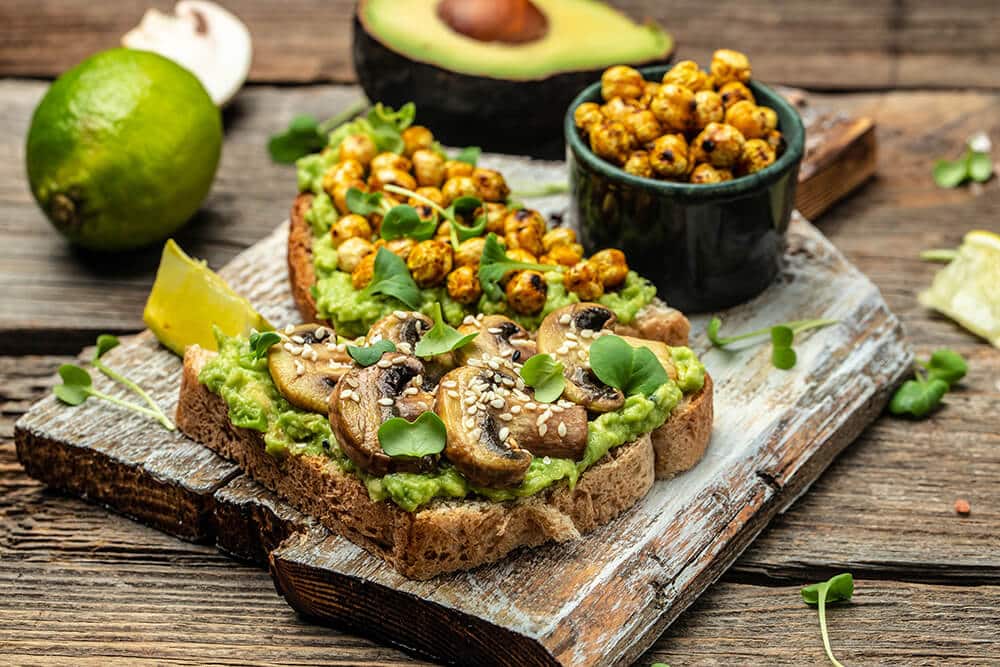
As highlighted in the article, Steven Van Dyken a researcher at the University of Washington is exploring chitin a unique compound in fungi as a substance capable of triggering an immune response that influences metabolism.
Chitin a type of fibre activates specific immune pathways, that help protect against external pathogens. It also stimulates glucagon production, a hormone essential for regulating appetite and improves insulin sensitivity. These properties suggest that chitin may play a key role in understanding immunity and metabolic health. Incorporating chitin-rich mushrooms and fungi such as Shiitake into the diet could therefore be a helpful tool in the selection of foods to help immune defences.
Much like lentinan, beta-glucans, antioxidants and prebiotics, found naturally in species such as Reishi, Lion’s Mane, Chaga, chitin emerges as a vital component in health management.
If you’d like to learn more about the properties of mushrooms or want to read other interesting articles like this one, don’t forget to subscribe to our newsletter here.
As detailed in our Pure Mushrooms section, many species most commonly used in traditional Chinese medicine are now backed by emerging scientific evidence supporting their applications.
Additionally, innovative food supplements with highly concentrated active compounds and pharmaceutical-grade safety standards are available. Examples include Hifas-Lentinan (a liquid Shiitake extract); Dr. Immune Five (a child-friendly liquid formula featuring extracts from the five key species of the fungal kingdom: Reishi, Sun Mushroom, Pleurotus, Chaga, and Shiitake) or Mico-Vir+ a (powdered extract combining Reishi and Cordyceps).
These supplements are developed by our laboratory, Hifas da Terra, backed by over 25 years of research and development in mushroom-based products used in Chinese medicine and with more than 20 R&D&I projects underway in collaboration with research centres, universities and health professionals from various fields.
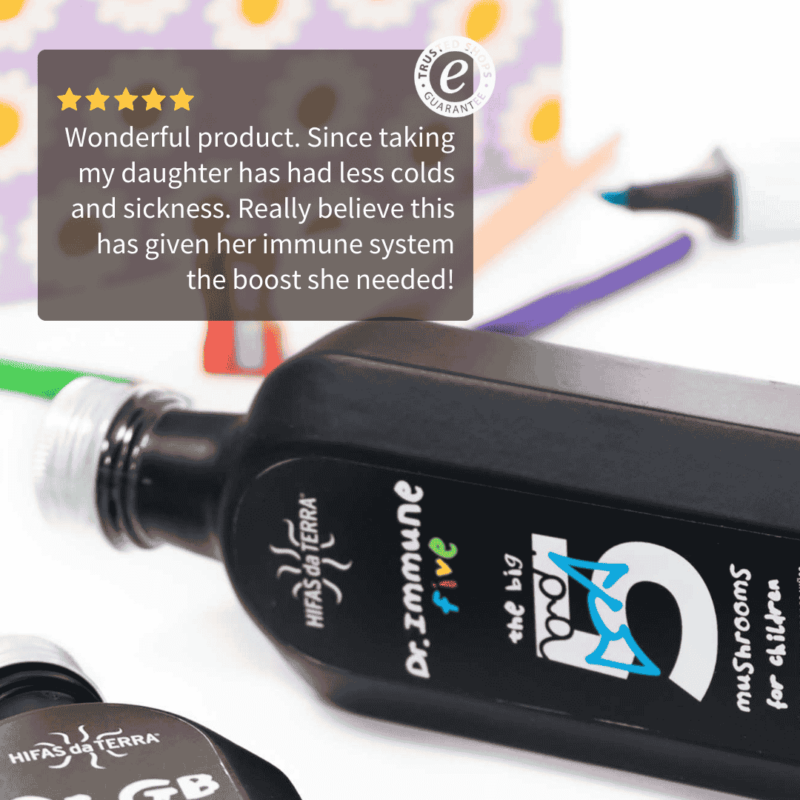
A diet high in fibre not only supports digestion but also has a positive impact on the immune system. Clinical trials referenced in the Nature article revealed that a lack of fibre compromises the gut microbiome, which plays a crucial role in supporting immune cells.
Fibre-rich foods such as fruits, vegetables, and whole grains encourage the growth of healthy gut bacteria, encouraging a balanced microbiota. Conversely, an imbalance in gut bacteria, known as dysbiosis, is now recognised as an indicator of various diseases and is under investigation for its links to metabolic disorders and cancer.
One study highlighted in the article, published in 2021, found that higher dietary fibre intake was associated with improved survival rates in people undergoing melanoma immunotherapy. Furthermore, mice with melanoma on a low-fibre diet showed a reduced number of cancer-attacking immune cells.
The Mediterranean diet (MedD) is among the most extensively studied for its impact on health. According to the article Current evidence on the health benefits of the Mediterranean diet, research on this diet’s effects on diseases – including cancer, cardiovascular, neurodegenerative, and autoimmune conditions – has increased significantly since the 1970s.
What is included in this type of diet? Fruits, vegetables, whole grains, olive oil, nuts, oily fish and fermented dairy products. Equally important is what it limits: red and processed meats, sugars, and unhealthy fats are either excluded or consumed sparingly.
As explored in Your Diet Can Change Your Immune System, emerging research suggests that tailored diets can optimise immunity and enhance the body’s natural defences.
Scientists have identified that different diets trigger different immune responses. For instance, a high-fibre vegan diet can support innate immunity (our rapid, non-specific defence) while a ketogenic diet may enhance adaptive immunity, which targets specific pathogens. This personalised approach to nutrition could shape the future of health care, where dietary interventions form part of holistic treatment plans.

While no single food can guarantee a flawless immune system, evidence suggests that certain foods, through their nutrients and unique compound combinations, can strengthen defences.
As discussed, a diet rich in fibre, antioxidants, healthy fats, and chitin-rich mushrooms, combined with regular physical activity can be an effective strategy to maintain a strong immune system.
Remember, diet is a critical factor in overall health. It is always advisable to seek guidance from health professionals who can assess your individual needs and help you make informed decisions about your nutrition and lifestyle.

La entrada The secret of keto, vegan and Mediterranean diets: foods to help immune defences se publicó primero en Hifas da Terra UK.
Hifas da Terra has been awarded the Nutraforum 2024 Award for Best Nutraceutical Company, recognising its commitment to innovation and the development of high-quality nutraceutical products. Nutraforum is part of a Spanish pharmaceutical industry event: Farmaforum.
The award was presented to Claudia Fernández, Hifas da Terra’s Innovation Hub Manager, by Lois Fraiz Ares, Director of Nutraforum, during the tenth-anniversary celebration of the Farmaforum congress. The ceremony attracted over 7,200 industry professionals, with participation from key figures including Eugenio Pérez de Lema Carmona, General Director of Farmaforum; Eduardo Sanz Sánchez, Director of the Farmaforum Congress; and Marcos Muiños Docampo, Commercial Director of Farmaforum.

Hifas da Terra continues to solidify its leadership in the research and commercialisation of functional mushroom-based nutraceuticals, achieving over 500% growth in international sales outside the European Union since 2021.
Fernández emphasised the importance of evaluating profitability and feasibility from the project’s inception, particularly when navigating regulations and potential costs associated with Novel Foods.
“The most critical phases of the projects are undoubtedly the initial ones, in which we focus on analysing the profitability and feasibility of the project. If Novel Food’s processing is involved, it would be necessary to contemplate the investment required for this process and the deadlines so that the project is economically viable and can reach the market within the established timeframe,”
The increase in sales abroad partly explains the growth and expansion of Hifas da Terra. 10% of its total sales now come from countries outside the EU. Fernández explained that growth in these markets has been exponential and highlighted the importance of adapting to local regulations, tariff barriers and the challenges arising from geopolitical tensions.
This award not only reaffirms Hifas da Terra’s position in the nutraceutical sector but also underscores its commitment to innovation and sustainable development in advancing health through science and biotechnology.
Hifas da Terra is a biotech based on research and innovation, with a high degree of specialisation in the development of nutraceuticals from functional mushrooms, with processes and products protected by patent or kept under industrial secrecy.
Health professionals from different countries trust in the formulas of Hifas da Terra, forming a multidisciplinary prescription network of more than 20,000 experts with whom it collaborates through its subsidiaries and distributors in Europe, the United States, the Middle East and new emerging countries.
Hifas da Terra has a team led by Dr. Catalina Fernández de Ana Portela, in addition to groups of national and international scientific advisors. The company develops formulas harnessing the bioactive properties of functional mushrooms, from research to production and purification
La entrada HIFAS DA TERRA RECEIVES THE NUTRAFORUM 2024 BEST NUTRACEUTICAL COMPANY se publicó primero en Hifas da Terra UK.
Linoleic acid is a polyunsaturated omega-6 fatty acid and a type of fat that our bodies cannot synthesise, meaning we must obtain it through our diet. Linoleic acid plays several important roles in the body:
Structural Component: It is a crucial component of cell membranes, helping to maintain their structure and flexibility.
Precursor to Other Compounds: Linoleic acid is a precursor to molecules, such as arachidonic acid, which is involved in our inflammatory and immune responses.
Skin Health: It contributes to skin health by helping to maintain the skin’s barrier function, preventing dryness and scaling.
Energy Source: Like other fats, linoleic acid serves as an energy source for the body.
Common dietary sources of Linoleic acid include vegetable oils (such as sunflower), nuts, seeds, and some animal products like poultry and eggs.

Several types of mushrooms contain linoleic acid, such as
Cell Integrity: Linoleic acid is a crucial component of cell membranes, helping to maintain their structure and flexibility.

Linoleic acid serves as a precursor to important bioactive compounds, such as arachidonic acid, which is involved in the production of eicosanoids. These are signalling molecules that play key roles in inflammation, immune responses, and other physiological functions.

Linoleic acid has anti-inflammatory effects that can help to soothe and calm irritated skin. This makes it beneficial for conditions like acne, eczema, and psoriasis, where inflammation plays a key role.
Linoleic acid is also present in argan oil and is one of the ingredients in our Mico-Repair cream. It is a key component of ceramides, which are lipid molecules that form a critical part of the skin’s barrier. This barrier helps to retain moisture and protect against external irritants and pathogens. contributes to skin health by helping to maintain the skin’s barrier function, preventing dryness and scaling.

Like other fats, linoleic acid can serve as an energy source for the body, contribute to a balanced intake of essential fats and help maintain lower levels of LDL. This is crucial to prevent an imbalance, that might promote inflammation.
Linoleic acid is a polyunsaturated omega-6 fatty acid that is essential for health but cannot be synthesised by the body, making dietary intake necessary. It plays several key roles, including maintaining cell membrane structure and flexibility, serving as a precursor to bioactive compounds like arachidonic acid, and supporting skin health by maintaining the skin’s barrier function and preventing dryness. Additionally, linoleic acid serves as an energy source and contributes to a balanced intake of essential fats, which can help regulate LDL levels.
Dietary sources of linoleic acid include vegetable oils (such as sunflower), nuts, seeds, and some animal products. Certain mushrooms, including shiitake, oyster mushroom, sun mushroom, reishi, and maitake, also provide linoleic acid, along with other beneficial nutrients.
The benefits of linoleic acid extend to supporting immune responses and skin health, making it an important nutrient for overall well-being.
La entrada Linoleic Acid: Why This Essential Omega-6 Is Vital for Your Health se publicó primero en Hifas da Terra UK.